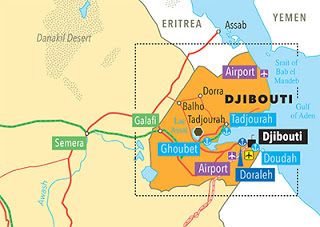

| Online: | |
| Visits: | |
| Stories: |

| Story Views | |
| Now: | |
| Last Hour: | |
| Last 24 Hours: | |
| Total: | |
China, Djibouti, and the New York TImes: How Much Debt?
The New York Times had a front page article on China and Djibouti this past weekend: “U.S. Wary of its New Neighbor in Djibouti — a Chinese Naval Base.” Like many observers, the NYT seems to have been misled about the scale of Chinese engagement, and Chinese lending to Djibouti in particular. Here's what they said:
Beyond surveillance concerns, United States officials, citing the billions of dollars in Chinese loans to Djibouti’s heavily indebted government, wonder about the long-term durability of an alliance that has served Washington well in its global fight against Islamic extremism.
Here at the China Africa Research Initiative we specialize in tracking and confirming Chinese loans in Africa. We have not been contacted by the US government, and we wonder where they are getting their “data”? In this instance, we were able to interview top ranking officials in Djibouti's Ministry of Finance to confirm Chinese loan financing.
Signed Loans/Debts Owed by Djibouti to Chinese Government (past decade). All in US$
1. Goubet/Ghoubet Salt Port Expansion: 64 million
2. Addis-Djibouti Railway (Djibouti share): 492 million
3. Djibouti-Ethiopia Water Pipeline: 322 million
4. Doraleh Container Terminal/Multipurpose
Port Expansion (the endpoint of the Ethiopia-Djibouti Railway)
and Damerjog Livestock Export Port: 405 million
TOTAL $1283 million, or $1.3 billion
We also have a confirmed report of $596 million in Chinese finance for two new airports, but this appears to be either a Chinese company suppliers' credit or a public-private partnership investment, not a Chinese government loan. However, even if we add this, the total comes to $1.9 billion. While several other projects–most prominently a toll road highway to the border–have been in the news, we confirmed that they are all still under discussion. Yes, $1.3 billion or even $1.9 billion is a large figure, but it seems inaccurate to call it “billions of dollars in Chinese loans”.
Undue alarmism? Another case of “alternative facts”? More reason to support an increase of $58 billion in the US defense budget? From what we can see, China's main rival in Djibouti has not been the US, but Dubai Ports World, which had a number of public-private partnership (PPP) port contracts in Djibouti, and had also arranged financing to build and operate ports in this important gateway to land-locked Ethiopia, one of Africa's most populous and dynamic countries.
As always, if someone has better information, please comment here or contact us directly at SAIS-CARI at Johns Hopkins University.
Source: http://www.chinaafricarealstory.com/2017/03/china-djibouti-and-new-york-times-how.html



